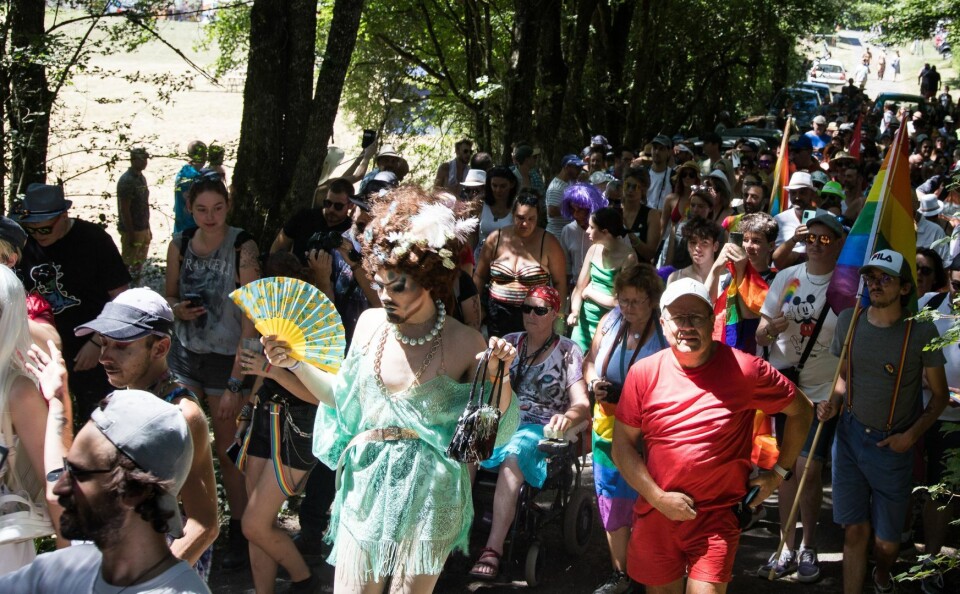-
Neighbour who complained about noisy cockerel in France ordered to pay €3,500
The complainant said the animal, which has since died, crowed too loudly and too often
-
From baguettes to oysters: France's vending machine industry is booming
We test the automated food dispensers that are popping up in car parks and lay-bys around the country
-
Find a rural home in France for under €100,000 without renovation hassle
See country houses for sale within this budget that are ready to move in to
LGBT people in rural France can ‘feel alone’ says Pride organiser
The first rural Pride was a huge success this summer but hateful emails sent after the event shows there is more to do outside big cities

France’s first Pride March was held in Paris in 1977 but members of the LGBT community in rural areas often remain isolated to this day.
That is why the STOP Homophobie association decided to organise the ‘first rural Pride march’, which took place in the village of Chenevelles in Vienne in west France on July 16, with openly gay local mayor Cyril Cibert.
Read more: Who can I complain to about discrimination in France?
‘They are alone’
Terrence Khatchadourian, founder of the association, said the event was three years in the making.
“Calls to our helpline increased by 30% over the last three years, mostly from rural areas.
“Not to report assaults, but to say they are alone and need to talk, to have fun, to exist,” he said.
“There have been village celebrations, but nobody dared to organise a Pride in rural areas.
“They are alone, who are they going to call to organise a march?”
Training at mairies
As well as feeling isolated due to a lack of local organisations or meeting spots, LGBT people in the countryside can find it more difficult to access help.
As part of the event, 89 rural mayors agreed to train town hall staff to deal with LGBT issues, so they will have a point of contact able to guide people on issues, such as how to file a complaint, for example.
Homophobic attacks in small towns
“Rural Pride is not just a march,” Mr Khatchadourian said. “It is saying we are here, we have dedicated people and tools to help them. We can provide lawyers, because there are fewer lawyers in the countryside.”
The most violent homophobic attacks often take place in small towns, according to the activist. “There are no police, nobody will be able to help.
“And if you are a victim, you could be scared your neighbours will find out, so you don’t report it.
“We need visibility in the countryside to make them feel we are here.”
The march had family atmosphere
The event struck a chord with more than 400 people of all ages participating in the march and more joining for the evening events. “We were expecting about 20 people.”
This included people who had never participated in similar events, and some who had never been open about their sexuality with their neighbours.
In a deliberate contrast to the “mostly commercial” Pride marches in major cities, participants marched alongside tractors provided by local farmers.
Mr Khatchadourian said he was surprised at the warmth of the reception. “There was a real family atmosphere, which I’d never experienced.”
The march also allowed others to see that LGBT people are not so different from them after all, he added.
“Now they know their neighbour is gay, they realise we’re not devils. They discovered that gays are funny and not what they thought.”
The hateful people are weak
Much was made of the geographical divide in France following the recent presidential election, with far-right Marine Le Pen doing particularly well in suburban and rural areas.
Although Emmanuel Macron received 60% of the second round vote in Vienne, and Chenevelles has a left-wing mayor, Mr Khatchadourian said this had been on their minds.
“The locals on the day were magnificent. Afterwards, however, we received dozens of hateful emails and phone calls,” he said.
“The hateful people hid away, so even if they don’t like us, we know they don’t have any power, they are weak.”
PM announces more support
In another marker of this progress, on August 4, Prime Minister Elisabeth Borne marked 40 years since the age of consent for homosexuals was lowered to 15 (as it already was for heterosexuals), by announcing €3million for the creation of 10 new LGBT+ centres.
The 35 existing centres provide support to people “who don’t know who to turn to”, and the plan is to have at least two in each mainland region.
She also announced that an ambassador would be appointed to promote LGBT rights around the world.
STOP Homophobie’s 24-hour helpline can be reached at +33 (0)7 71 80 08 71.
Related articles
Gay conversion therapy to become a specific crime in new law in France
‘We wanted to show women pastors (and lesbian ones) exist in France'
US tennis icon Billie Jean King to be awarded French Légion d'honneur
























